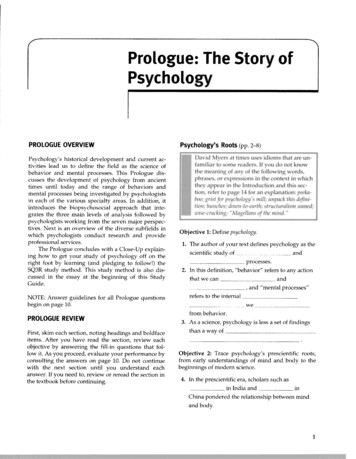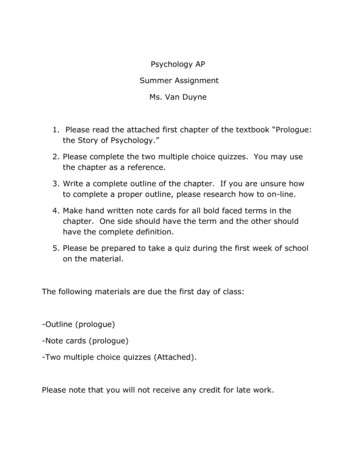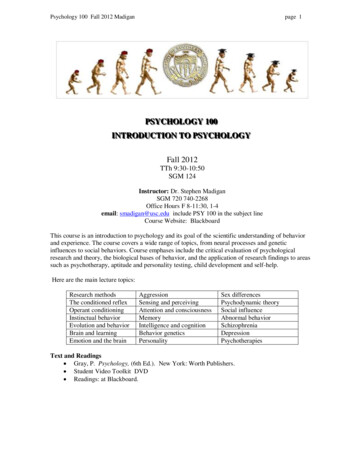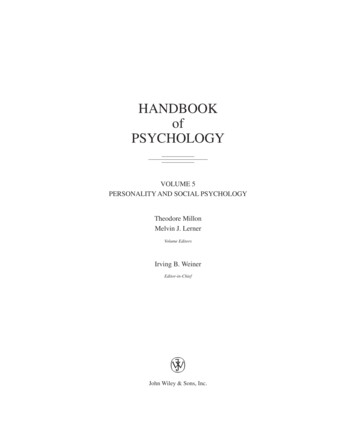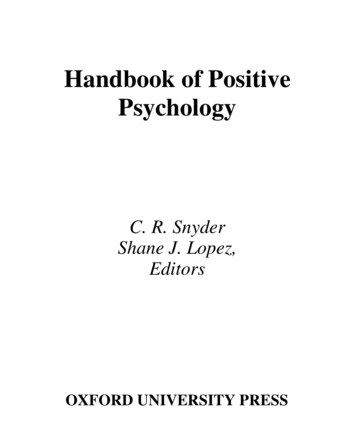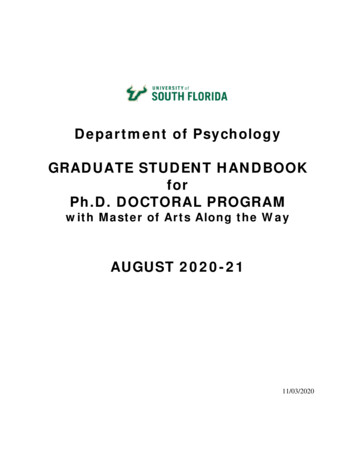
Transcription
The School Psychology ProgramHANDBOOKDepartment of Graduate PsychologyCollege of Health and Behavioral StudiesJames Madison UniversityHarrisonburg VA 22807August, 2019http://psyc.jmu.edu/school/1
Table of ContentsProgram GuidelinesThe University p.4The Department of Graduate Psychology p.4The School Psychology Program p.5Admission to Program p.6Expectations for Students p.7Advising, Transfer Hours and Financial Aid p. 8Program of Study p.9Course Sequencing p. 10Objectives and Alignment p.13Student Progress and Retention p.15Comprehensive Examinations p.20Performance Based Evaluations p.20Deadlines and Other Important Information p. 21Organizations p.22References and Job Search p.22Program Structure and Organization, and Evaluation p.23Program Faculty p.23Culturally Competent Practitioner Initiative p.26School Based Substance Use Treatment Training Initiative p. 29Field Placement Handbook p.30The School Psychology Practicum Sequence p.31The School Psychology Internship p.36The School Psychology Internship Goals p.47Educational Specialist Research Project GuidelinesPSYC 800: Overview of Ed.S. Research Project (Thesis) p.48Appendix A: Graduate Assistantships p.51Appendix B: Resources and Services p.52Appendix C: 2018-2019 Pertinent University Calendar Dates p.55Appendix D: School Psychology Summer MultidisciplinaryAssessment Practicum Evaluation p.56Appendix E: School Psychology Practicum Evaluation MID Semester p.66Appendix F: School Psychology Practicum Evaluation END of Semester p. 72Appendix G: School Psychology Internship Evaluation p.85Appendix H: Log Coding System p.992
Appendix I: School Psychology Field Experience Checklist p.100Appendix J: Professional Development Progress Form p.105Appendix K: Portfolio and Evaluation Rubric for Portfolio p.113Appendix L: Application for a Graduate Degree p.117Appendix M: Ed.S. Proposal and Defense Evaluation p.1183
The UniversityWelcome to the School Psychology Program at James Madison University! The purpose of thishandbook is to help your experience here be a successful one. JMU was established in 1908 andis named for James Madison, fourth president of the United States and "Father of theConstitution." In its 100-year history, James Madison University has grown from a state normaland industrial school for women to today's comprehensive university. As a comprehensiveuniversity, JMU offers programs in the liberal arts, sciences, business, education, fine arts,communication, and health and human services, including 61 graduate degrees. Current totalenrollment is approximately 21,227 consisting of approximately 19,262 undergraduate studentsand 1,517 students taking graduate courses or other classes beyond the baccalaureate level. JMUhas 111 major campus buildings on 712 acres, including a 31-acre farm. JMU offers its studentsa full program of extracurricular and social programs, as well as a diversified program ofintercollegiate and intramural athletics.For several years, JMU has been among the highest ranked public institutions in U.S. News &World Report's regional surveys. The University also has been cited by U.S.A. Today, ChangingTimes and Money magazines, and in several guides to America's most prestigious colleges anduniversities.The Department of Graduate PsychologyThe Department of Graduate Psychology at JMU is a unit with ten graduate programs andapproximately 150 graduate students. We are served by 31 full-time faculty, 12 instructors, and12 teaching and graduate assistants. The graduate assistants are shared with our sister unit, theDepartment of Psychology with 800 undergraduate majors and one of the largest departments ofpsychology in the region. Accomplishments of the faculty include numerous national leadershippositions in professional organizations such as presidencies, memberships on board of directors,extensive involvement with accreditation agencies, and significant leadership positions that haveinfluenced the course of professional psychology and counseling. Within the Commonwealth ofVirginia our faculty members have held prominent leadership positions involved with theformulation of public policy regarding the provision of psychological services to children,adolescents, and families.Graduate Training in PsychologyThe Department of Graduate Psychology at James Madison University has a long history ofgraduate training in Psychology. Both the School Psychology and Counseling Psychologyprograms were begun in 1968. Initially, both of these programs offered only the master’s degree.The Educational Specialist degree was instituted in the School Psychology Program in 1981, andin the Community Agency Counseling Program in 1984. In addition, the Department began amaster's degree program in General Psychology in 1977, and the Ph.D. Program in Assessmentand Measurement in 1998. The JMU Combined-Integrated Doctoral Program in Clinical andSchool Psychology, accredited by the American Psychological Association in 1996, is an4
innovative, applied professional psychology program that leads to the awarding of the Doctorateof Psychology (Psy.D.) degree. The department’s mission is to transform students intooutstanding practitioners and scholars of psychology. Faculty and students work to create acommunity that celebrates diversity and creativity, and that values learning, scholarship, andservice to othersThe School Psychology ProgramMission StatementThe School Psychology Program at James Madison University is housed within the Departmentof Graduate Psychology and the College of Health and Behavioral Studies. The SchoolPsychology Program is fully approved by the National Association of School Psychologists(NASP) with our last full approval granted in 2012. The program received unconditionalapproval by the Council for the Accreditation of Educator Preparation and NASP in the midcycle review in 2015. Central to the program focus is the understanding of children within asystems context, including the family, the school, and the socio-cultural environment. Theprogram emphasizes the role of the culturally competent school psychologist as that of afacilitator of an individual's overall well-being and potential. Within an integrated theoreticalframework, students are prepared to be culturally competent, interpersonally skilled, dataoriented problem solvers. Students are prepared in assessment for intervention, prevention,counseling, educational and mental health consultation, behavior management, and appliedresearch. They are prepared to be applied child and adolescent school psychologists in diverseeducational and mental health settings. The program expects students to have a commitment toacademic excellence, personal growth, professional responsibility, sensitivity to andunderstanding of human diversity, and effective interpersonal relationships.Program GoalsSpecifically, graduates of the School Psychology Program are required to be competent in thefollowing areas:1.Students will achieve a breadth of understanding of the foundations in the knowledgebase of psychology and related disciplines, including: Biological Bases of Behavior, HumanLearning, Social and Cultural Bases of Behavior, Life-Span Development, and IndividualDifferences, including Developmental Psychopathology.2.Students will achieve basic knowledge of educational issues including instructionaldesign, effective educational environments, academic interventions, and organization andoperation of schools.3.Students will possess knowledge and expertise to collaborate with families and withcommunity and school professionals in designing, implementing, and evaluating interventionsthat effectively respond to the educational and mental health needs of children and youth.5
Areas of knowledge and practice shall include: Assessment for intervention - cognitive, educational, social, behavioral, emotional; Individual counseling within a systems context; Group counseling; Consultation with parents/families; Consultation with teachers/community professionals; Professional Development for school personnel; Consultation for systems/organizational change.4.Students will achieve basic knowledge and skills in research/evaluation methods,statistics, and measurement to evaluate professional practices and programs.5.Students shall have a knowledge base specific to school psychology and will apply thisknowledge to promote a best practice approach to professional service. This knowledge baseincludes: History and foundation of school psychology; Roles and functions of school psychologists; Legal, ethical, and professional standards; Alternative models for the delivery of school psychology services; Emergent technologies.6.Students will demonstrate a commitment to personal growth, self-awareness, andsensitivity to and understanding of others. They will apply this orientation to build and maintaineffective relationships with children, adolescents, parents, teachers, colleagues, and otherprofessionals.7.Students will demonstrate personal and professional characteristics of a culturallycompetent practitioner. (Refer to Culturally Competent Practitioner Initiative description).ADMISSION TO PROGRAMSThe School Psychology program is a continuous program which requires full-time enrollmentand residency of all students.Master's Degree (Level I):The James Madison University School Psychology Program seeks a diverse student population.JMU does not discriminate on the basis of race, color, national origin, religion, gender, age,veteran status, political affiliation, sexual orientation, disability (in compliance with theAmericans with Disabilities Act) with respect to employment or admissions, or in connectionwith its programs or activities.Minimum admission requirements for entry into the Master's level (Level I) of the schoolpsychology program include: completion of a baccalaureate degree with a designated above6
average grade point average, designated above average scores on the general portion of theGraduate Record Examination, three completed reference forms from individuals familiar withthe student's potential for graduate education, a personal goals statement, a minimum of 18 credithours of undergraduate psychology and/or related educational or behavioral science courses(including statistics), successful performance in a personal interview conducted by the facultyand students, and a writing sample.Educational Specialist Degree (Level II):Minimum admission requirements for the Educational Specialist degree in School Psychologyinclude a 3.5 grade point average in the Master's program. For those students currently in theJMU (Level I) program, a satisfactory review by the Program Committee, which includesassessment of the student's interpersonal skills, aptitude for school psychology, and "passing"scores on the required Master's level comprehensive examination are also necessary foradmission to this level (Level II). Level II decisions by the faculty are based on classroomperformance as well as ethical and personal-social behavior of students seeking to becomeprofessional psychologists. Students applying to the program with a Master's degree orequivalent from another institution will be required to proceed through the Graduate School'sapplication process including submitting three references, evidence of satisfactory performancein the Master's degree program, a personal interview with the faculty and a writing sample.Deadline for application materials: February 1 to guarantee review by admissions committee.Screening interviews are then held in late February and early March for admission to thefollowing Fall semester. Applicants must be invited to the screening interviews, a requiredcomponent of the admission process.EXPECTATIONS FOR STUDENTSCommitment to academic excellence:The depth and breadth of the curriculum reflect the expectation for excellence. Students areexpected to fulfill all course requirements and are encouraged to extend their knowledge beyondminimal course requirements.Commitment to ethical and professional behavior:The expectations for ethical and professional behavior are discussed during advising sessions, incourses, and in practicum. Professional and ethical behavior is monitored throughout thestudents program following National Association of School Psychologists (NASP) and AmericanPsychological Association (APA) standards. Students may receive an unsatisfactory grade inpracticum and other courses for ethical and professional behavioral problems.Commitment to respect for human diversity, and the development of effectiveinterpersonal relationships:These expectations are based on the belief that fellow students, staff and faculty, as well asclients, deserve respect, cooperation, and sensitivity and should be treated accordingly.7
Commitment to personal growth and self-awareness: These expectations are discussedinitially in the screening interviews. Expectations for self -growth continue to be discussed inthe advising process and experienced in a variety of courses. Students are strongly encouragedto participate in personal counseling while in the program. Services are available at no costthrough the JMU Counseling and Student Development Center.Process Groups:Since an important value of an effective mental health professional is a commitment to personalgrowth and self-awareness, each student will participate in a process group. The group meetsweekly for approximately 6 sessions during the second year of the program. The group providesa forum for discussing personal, professional and ethical issues that arise during training. Theprocess group focuses on professional development and personal concerns that arise in thatcontext such as stress management, group dynamics, and conflict resolution. As such, the groupis designed to be non-evaluative and provide a safe environment to explore these issues ingreater depth than possible in other training experiences.The process group is an opportunity for students to understand the influence of their personalissues that emerge in relating to clients and colleagues – for example, counter-transference withclients and effective collaboration with other professionals.The process group is not supervision, group therapy, or case consultation. While this is not atherapy group, the process group leaders follow the same guidelines of confidentiality.Therefore, they do not share any information with faculty members unless student or client wellbeing is of concern. We invite students to take full advantage of this opportunity by taking risks,participating fully in the experience of sharing and listening, and contributing to the group.*The Department of Graduate Psychology is committed to the success of the students in each ofits programs. Because of this commitment, faculty members within the Department frequentlydiscuss students’ academic progress and professional development. As appropriate, theAcademic Unit Head and other members of the JMU community (e.g. those who teach studentsin courses and practica, internship, assistantship, and research supervisors) maybe included insuch conversations.Please see JMU’s Student Handbook for a detailed description of university policies andregulations, including grievance procedures: www.jmu.edu/handbook.ADVISING, TRANSFER HOURS AND FINANCIAL AIDA.AdvisingStudents are assigned faculty advisors upon acceptance to the program. Faculty welcomeinvolvement in program planning, courses, and activities. Students must meet with theiradvisors at least once each semester to discuss their progress in the program. Students are8
expected to be thoroughly familiar with program requirements and are responsible forcompleting paperwork by the deadline stated. Every student will have an email account which isthe primary means of communication.Students may also seek assistance from the Director of the School Psychology Program or otherschool psychology committee members. It is the responsibility of students to stay in contact withtheir advisors.B.Transfer HoursOne-third of the total hours required with a B grade or better may be transferred into the Mastersdegree. Courses may not be transferred for credit if used for another degree. Advisors revieweach Program of Study, and in some cases, may waive certain course requirements as appropriatefor either the Master’s degree or the Ed.S. degree. Forms for transfer approval, substitutions, orwaivers should be obtained from the Graduate School website.C.Financial AidThe university has a limited number of teaching and graduate assistantships which are highlycompetitive. The Department of Graduate Psychology has assistantships available forpsychology students, including the Test Library, undergraduate teaching support, andadministrative support. Many students find assistantships in other departments and divisionsacross campus.Graduate assistants (GA) may assist faculty members in preparing for instruction, in conductingclasses and tutoring. Other duties assumed by GA's may include: grading papers, conductingresearch and library work, maintaining the test library, and assisting program coordinators. GA'swork 20 hours a week, carry a course load of nine to twelve credit hours of study, and must beenrolled in a degree program. Teaching assistants (TA) are expected to instruct six credit hoursof course work per year. TA's carry a course load of six to nine credit hours of study and mustbe enrolled in a degree program.Applicants should have overall undergraduate records of "B" or higher. Application forms areavailable online at the JMU Joblink site. TA's and GA's are available in other departments, andother forms of financial aid can be explored with the Office of Financial Aid and Scholarshipslocated in Warren Hall. Students need to apply each year that they wish to have a GA/TA andmay maintain the position in the Department of Graduate Psychology for no more than twoyears. If students wish to obtain additional employment while holding a GA/TA, discussion withthe Program Director should occur to ensure that all responsibilities can be maintained.Fellowships may be available for those without a graduate assistantship. A Financial Aid Form(FAF) form must be on file at the JMU Financial Aid Office before applying for a fellowship.Fellowship applications are available at the graduate office and are due before the first day ofclasses each semester.9
PROGRAM OF STUDYThe program is designed to prepare students for employment in a variety of settings includingschools, mental health clinics, rehabilitation agencies, and private practice settings. An emphasisis placed on an integrated model of training with a substantial focus on field and practicumexperiences.The first level of the program includes basic psychological foundations and leads to a Master ofArts degree (33 credit hours). Successful completion of the Master’s degree and facultyapproval enables the student to move to the Educational Specialist level of the program. Asecond year of course work, in addition to a research project and a 10 month internship, leads tothe Educational Specialist degree (an additional 45 credit hours).To be admitted to the Educational Specialist level of the school psychology program, studentsmust have completed a Master’s degree in psychology or a related field. Students who have anappropriate Master’s degree but who have specific deficiencies can be admitted to theEducational Specialist program provided that these deficiencies are included in the EducationalSpecialist program of study.Students completing only the Master’s degree are not eligible for licensure as a schoolpsychologist. The Educational Specialist degree is the entry-level credential in schoolpsychology and leads to eligibility for licensure as a school psychologist by the Commonwealthof Virginia Department of Education. To be recommended for licensure to the Commonwealth ofVirginia Department of Education, students must complete all program requirem
The Department of Graduate Psychology at JMU is a unit with ten graduate programs and approximately 150 graduate students. We are served by 31 full-time faculty, 12 instructors, and 12 teaching and graduate assistants. The graduate assistants are shared with our sister unit, the

